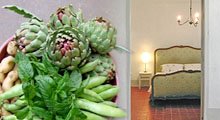
My haul from the garden last night - artichokes, broad beans, the first handful of new potatoes and a bunch of mint.
The potatoes were a trial lifting to see if our drought ravaged potatoes are looking as sad beneath the ground as above it. Fortunately the answer seems to be know, but I'll leave them a few more weeks to develop now that the watering system on the potager is functioning again.
The rest went into a pasta 'Primevera' along with other fresh veg bought at the farmer's market in Velleron the other day.
Pasta Primevera
For six of us...
A desert bowl each of shelled broad beans, fresh peas, and small courgettes about 10cm long and cut into 2cm slices
6 artichoke hearts, trimmed and de-choked
A good handful of fresh mint
5/600g Pasta - Orecchiette preferably
Olive oil
Nut oil
White wine
A lemon
Lemon juice
Salt
To serve - coarse sea salt, ground black pepper, Parmesan
Start with the artichokes - I'm not going to tell you how to prepare them because there are loads of descriptions for this process already to be found on the internet. Try this one from Sam Breach's Becks & Posh (rhyming slang for nosh) blog. The secret really is lemon juice. When you've prepared one artichoke heart, chuck it into a bowl of water laced with a good squeeze of lemon juice to stop it discolouring.
For this recipe, cut the artichoke hearts vertically into quarters. Boil them for 5/10 minutes until they are soft enough to pierce easily with a sharp knife. The ideal finish is to blacken them slightly on a barbecue or grill pan, but if this isn't an option, fry them 'til they crisp up slightly in the oil about to be used for the courgettes.
So your artichokes are ready. Your beans and peas and courgettes are all prepared. It doesn't take long to bring the whole thing together now, so it's time to put the pasta on. Bring a large pan of water to the boil, salt it generously and pour a good glug of olive oil onto the surface. Chuck in the pasta and cook it at a rolling boil until 'al dente' (soft but still chewy, not reduced to a pulp!).
While the pasta is cooking, the broad beans and peas will also need a quick boil (you can use the water you just boiled the artichokes in). 5 minutes should be the maximum if the broad beans are young and delicate as ours were last night. If they're a bit older and tougher, let the beans have a 5 minute start over the peas.
(A note about peas - fresh ones really are better than frozen in this case. Their texture is so much better than the soft, frozen ones.)
As the pasta, beans and peas boil, fry the courgettes in a shallow pan on a high heat in olive oil with a dash of nut oil added and a sprinkling of salt to draw out their flavour. For a little extra 'zing' try adding the grated rind of the lemon too. When they are a little browned and crisped, chuck a slug of white wine into the pan to deglaze any pan juices and boil it off, before tossing in the artichoke hearts for a quick final heat through.
About this time, the pasta should be cooked, as too the beans/peas. Toss the drained beans and peas in with the courgettes and artichokes. Drain the pasta and return it to its cooking pan along with the vegetables. Toss them all together.
Pull the mint from its stems and chop it roughly. Then as you spoon the pasta into a suitably beautiful serving bowl with a slotted spoon, sprinkle chopped mint into the mix as you go. This avoids tossing the pasta in the serving bowl, which always seems to result in the pasta rising to the top and the vegetables sinking to the bottom.
Finally dress with a drizzle of good quality olive oil and the juice of the lemon and serve with crunchy rock salt, coarse ground black pepper for those who require further seasoning and Parmesan cheese from which your guests can cut shavings with a potato peeler.
Alternatives
Try adding asparagus tips or/and green beans. Try it later in the summer with roasted cherry tomatoes, toasted pine nuts and basil - we will and I'll share the results here.





No comments:
Post a Comment